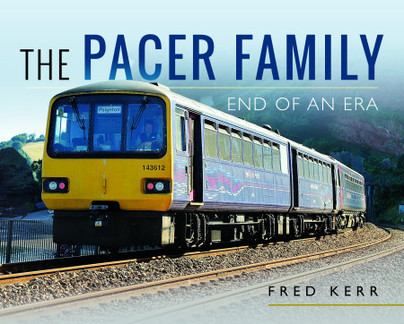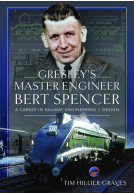The Pacer Family (Hardback)
End of an Era
Imprint: Pen & Sword Transport
Pages: 120
Illustrations: 214
ISBN: 9781526726933
Published: 2nd May 2018
(click here for international delivery rates)
Order within the next 5 hours, 19 minutes to get your order processed the next working day!
Need a currency converter? Check XE.com for live rates
| Other formats available - Buy the Hardback and get the eBook for free! | Price |
|---|---|
| The Pacer Family ePub (32.3 MB) Add to Basket | £10.00 |
In the 1980s British Railways sought a cheap replacement for the ailing Diesel Multiple Unit (DMU) trainsets which saw the introduction of the Class 14x trainsets that became known as Pacers. These proved to be cheap to operate hence popular with the operators but less popular with the travelling public who found the rigid 4-wheel chassis provided a basic and uncomfortable ride.
Fred Kerr, a life-long rail enthusiast and well-known railway photographer, became familiar with these trainsets when the Class 141 trainsets passed near to his parent’s house in Corby whilst being trialled between Derby and Bedford and, later, when the Class 142 trainsets appeared in his home town of Southport as part of the driver training programme for Wigan crews prior to working local services to Manchester.
He has continued taking photographs of the Pacer trainsets, which he sees as part of the evolving traction changes, hence has a collection of images from the various stages of the Pacer history that forms the basis of this album. The images cover a wide variety of locations and, surprisingly, reveal little known facets of their life; the rarity of Class 141 trainsets initially provided with Workington Blue livery, the unusual operation of Newcastle-based trainsets on the Windermere branch and the wide variety of trainsets that have operated in his home county of Lancashire.
The Pacer trainsets were introduced in the mid-1980s and will be withdrawn by 2020, due to their failure to meet the requirements of the Rail Vehicle Accessibility (Interoperable Rail System) Regulation 2008. Fred Kerr’s book chronicles their contribution, during their years of service, to the operation of railway services, many of which would otherwise have been closed without the availability of the “cheap and cheerful” Pacer trainsets. As they enter their final years of service, this album celebrates the many services that have been operated, the builders who supplied them and the operators who have used them on their services throughout the years.
This latest publication by Fred Kerr is a lavishly illustrated hard bound book which will probably end up being the definite work on this much maligned class of railcar. The class was first introduced in the 1970’s as a cheap replacement for the ailing fleet of DMU’s, essentially a bus body married to a four-wheel chassis. Although much liked by the operating companies for cheap construction and “initially” low operating costs, this generally was not the opinion of passengers, particularly if they were employed on long distance working - in your reviewer’s case, having to ride the coast line from Carlisle to Carnforth. in a well past it’s best Pacer. From the enthusiast point of view they do have points in their favour, I know of at least two well known railway photographers, one who profess to have photographed every example of colour scheme carried, and the other who feels that the short train lengths helps with the composition of his pictures!.
Bradford Railway Circle
Fred is to be congratulated in firstly compiling the excellent selection of pictures, mostly showing the railcars in scenic settings, far better than just three quarter views of each type and livery, in my opinion. This makes the book far more interesting to the general enthusiast. Time will tell if after the classes are finally withdrawn by the proposed date of 2020, nostalgia for the past will mean that we may pay to travel on a Pacer on a preservation line, as has already happened on at least one preservation site.
To sum up - a profusely illustrated book with photographs of excellent quality many of full page size, well captioned and representing the many variations of type and livery.
Sometimes described as Britain's least loved train the Pacer began when British Rail sought a cheap replacement for the Modernisation Plan diesel multiple units.
Welsh Railways Research Circle No.156
Among wide ranging pictures there are some of Pacers in Wales, with a delightful view of 143616 entering Pontypridd on a snowy February day, arguably the best in the book.
About Fred Kerr
Fred Kerr is a photographer whose lifelong interest in railways began in Edinburgh during the early 1950s and has continued throughout his life since. His family move to Northamptonshire in 1956 introduced him to the Midland Main Line where the transition from steam to diesel traction became important as Derby Works reflected the change with new locomotives being tested and introduced to service. His early ventures into photography began in 1961 but became established during his University years in the early 1970s. Taking early retirement in 1994 he has spent time working for Colin Garratt, a muse whose inspiration provided opportunities to photograph railway scenes that have proved to be historic as the railway undergoes changes in both its structures and operations.





















